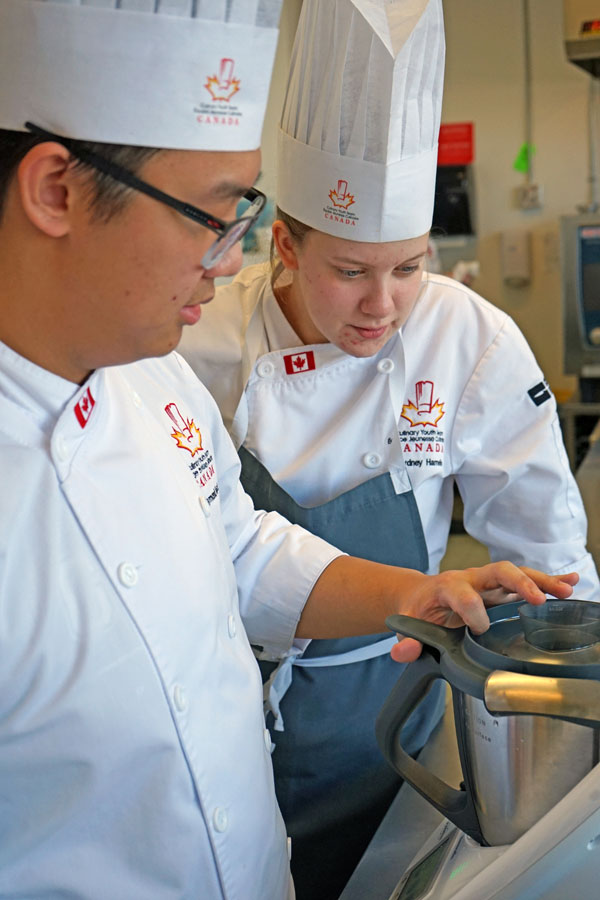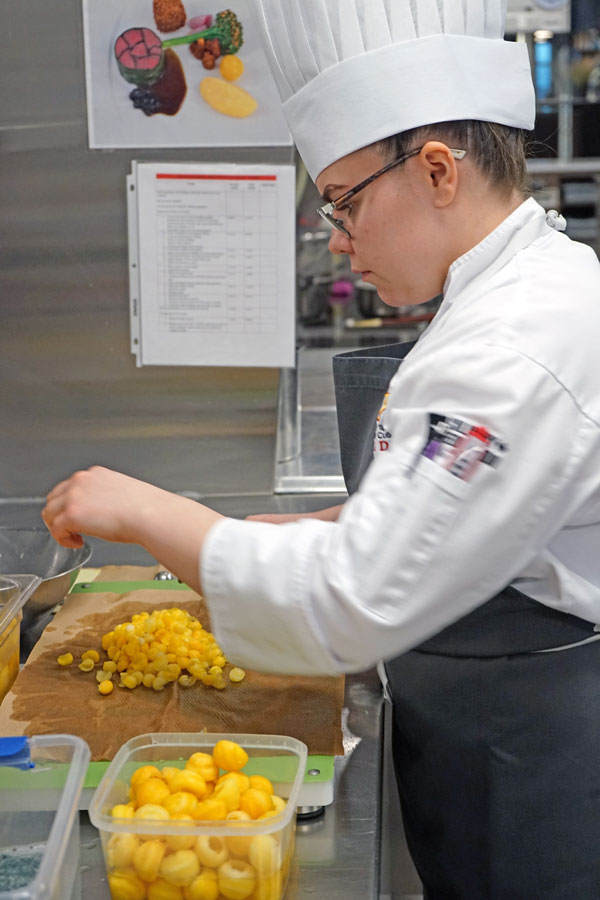Culinary Youth Team Canada heads to Europe in February for the Culinary Olympics
Ask just about anyone to name an Olympic sport and you will probably hear replies like the 100 meter dash, hockey, gymnastics, swimming, curling, cycling, ski jumping, and rowing. But what about Restaurant of Nations and Buffet? Wait, buffet?!
Buffet is one ‘sport’ that culinary teams will compete in at the IKA/Culinary Olympics held in Stuttgart, Germany in mid-February. Just like the regular Olympics, these Olympics are held every four years. Teams from across the globe compete for the top prizes and this year’s Canadian youth team is based here on Prince Edward Island, training at the Culinary Institute of Canada.
Kevin Boyce is a coach for the youth team and he sums up the competition in a nutshell, “We do it for the personal challenge, but we also do it to get exposure for Canadian tourism.”

The main course for the culinary competition’s Restaurant of Nations Photo credit: Cheryl Young/Salty
The team will compete against 20 other nations in two categories, the ‘Restaurant of Nations’, a three course menu prepared for 60 people, and the IKA Buffet, prepared for 12 people. The three-course menu has the team in the kitchen for most of the day, preparing, and then serving their dishes. The buffet competition is more time-sensitive, allowing the teams to prepare their dishes in only four hours. The buffet menu must include two hot and two cold finger foods, a seafood platter with three terrines, garnishes, and sauces as well as a main course hot preparation with rabbit. The buffet is finished off with a dessert with at least two components, one of which has to be hot.

Ryan Llewellyn prepares the halibut appetizer for the three-course menu Photo credit: Cheryl Young/Salty
Like the sporting Olympics, gold, silver, and bronze medals are awarded, however, multiple teams can win the same medal in each category. For example a gold medal is awarded to a team with between 90 and 100 points, a silver has between 70 and 89.99 points, etc, allowing for multiple gold, silver, and bronze medals. Then the teams with the highest scores for each competition are awarded gold, silver, and bronze for each category and then the overall Olympians come from those winners.
The nine-member team has chefs from across Canada, with BC, Alberta, Saskatchewan, Manitoba, Ontario, Nova Scotia, and PEI representatives. Formed as part of the Canadian Culinary Federation’s mandate in June of 2017, The Culinary Institute of Canada was chosen to represent Canada with this youth team. They competed in Luxembourg at the World Cup in late 2018, but when the team reconvened in early 2019, only two original team members from that competition remained.

Raymond Mock and Sydney Hamelin work on a terrine for the buffet platter Photo credit: Cheryl Young/Salty
As the year progressed, new team members came on board, many through the Skills Canada program. As Canada’s large geographic nature causes difficulty with coordinating training and practices, a different approach was taken.
“We’re so widespread [as a country] that it’s very difficult without turning it into a full time job,” Boyce explained. “You don’t get the amount of time towards practicing, so we took it a little differently this time around and said, ‘this is going to be your job.’”
Chelsea Hoeppner is from Manitoba and a recent graduate of the Culinary Institute. “It was definitely a big transition from being a student to now being staff.” The transition seems to have worked, as she and fellow team member Ryan Llewellyn competed last October at the Nations’ Cup in Michigan, US. They brought home six gold medals, a Best of Show, and a silver medal. They also were awarded the inaugural Friendship Award.

Chelsea Hoeppner in the Culinary Institute’s kitchen, preparing for the three-course menu Photo credit: Cheryl Young/Salty
The team has been busy perfecting their Olympic dishes at the Culinary Institute. They have a dedicated kitchen space and like other ‘athletes’ they spend their days honing their skills. The rules of the competition mean that things like artificial colouring are banned, so having a dish that pops means creating a natural colourant like the bright green of chlorophyll. The old adage ‘you eat with your eyes’ is very true here and Boyce knows that wowing the judges initially is vital.
“If you can’t give them that initial sensation of interest and intrigue, then you may not officially be down a point or two, but you’ve started off poorly with them. And then they’re not as subjective when they go into the tasting mode of it.”
As it is the Junior competition, all team members must be under the age of 25 at the time of competition.
When Logan Rafuse joined the team, he knew he’d just squeak in as his birthday falls in February. “So at that time, the rules for the Olympics were in their infancy. They weren’t really finalized,” Rafuse explained. “And it said that as long as you were under 25, as of January 1 2020, so like the start of that year, right, you’d be okay to compete. Then when they put out the updated rules, they changed that to February 19 2020. And my [25th] birthday is on the 15th of February.”
“Our team captain, and I feel sorry for him everytime I say this, he misses the deadline by four days,” Boyce said.
Boyce went on to praise Rafuse for agreeing to stay, “my kudos to him…he was in for the entire run. It was a hard pill to swallow for all of us. He’s very calm, team members rally around him, he’s a mentor.” Rafuse helped develop the menus, and he’s proud of the food the judges will see and taste in Germany.
He will still attend the Olympics, but will watch from the sidelines. Boyce was cautiously optimistic about the team’s chances for a medal, “I truly believe that we have a great opportunity here to be in the top three, which has never happened before.”
- WTF - December 2, 2020
- WHAT GOES AROUND COMES AROUND - June 12, 2020
- Salty’s 2020 Gift Guide - December 2, 2020
- A RETURN OF DELIVERY - May 6, 2020
- ICYMI - April 22, 2020
- NEW BIOMASS BOILERS FOR LOCAL GREENHOUSE - March 31, 2020
- TOP CHEF CANADA COMPETITOR FROM PEI - March 4, 2020
- FOOD INSECURE - March 1, 2020
- ACCESS TO FRESH PRODUCE - March 1, 2020
- POLITICS OF SCHOOL FOOD - March 1, 2020


